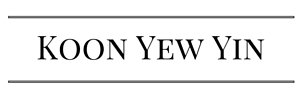(This post was originally published at klse.i3investor.com)
I refer to the Business Times 17th Jan 2014: Head Line ‘Wilmar hurting palm oil exports’
MALAYSIA will lose billions of ringgit in palm oil exports should Wilmar International Ltd be allowed to discriminate against Sarawak’s palm oil supply.
Sarawak Oil Palm Plantation Owners Association (Soppoa) said it strongly rejected attempts by Wilmar, Unilever Plc and World Wide Fund for Nature (WWF) to discriminate against the state’s palm oil supply and, in the same process, jeopardise Malaysia’s palm oil exports.
“We are very disappointed with Wilmar’s unilateral action to discriminate against palm oil harvested from oil palm trees grown on peat soil,” said Soppoa manager Melvin Goh.
Read more: ‘Wilmar hurting palm oil exports’http://www.btimes.com.my/Current_News/BTIMES/articles/20140117014922/Article/index_html#ixzz2qcXEvjUr
My article:
Some observers in the west used it as an occasion to bad-mouth the oil palm oil further. In this article, I will try to share some facts of life in the oil palm industry so that Malaysians will not join the western world in their smear campaign.
Firstly, we must remember that the west had cut down their forests and trees centuries ago to develop their countries. Malaysia and Indonesia are both new comers in the development scene and have been felling our forests for only a few decades now. Of our tropical agricultural crops, oil palm is the most recent cash crop commodity.
Although there has been a rapid rate of exploitation, it still occupies a small proportion of our total land area. The oil palm industry in Malaysia accounts for 15.5 per cent of total land area and only 4.5 per cent of total land area of Indonesia. A large proportion of the oil palm plantations are also not newly felled forest but are old rubber plantations that have been converted to this more lucrative crop.
Many in the public know of my views which are critical of many developments in the country. However, praise needs to be given when it is deserved; and our home grown oil palm industry is one which deserves all our support. This support is important in view of the sustained criticism made against the oil palm industry by lobby groups that have their origin in the west.
Why We Should Support Our Oil Palm Industry
There are many good reasons to support our oil palm industry in Malaysia and Indonesia. These are some of the most important.
1. Firstly it is not only Felda settlers that are dependent on the crop for a livelihood. Malaysia’s annual US$25 billion (RM79.75 billion) palm oil exports support some two million jobs and livelihoods along the sprawling value chain. This means that one in every five working Malaysian is dependent for his or her livelihood on the crop.
2. Plantations have borne the brunt of the bad publicity. However, the small farmers are also affected. More than 40 per cent of oil palm planters in Indonesia are smallholders whilst in Malaysia they contribute to 38 per cent of the country’s palm oil output.
3. Environmental activist groups such as World Wildlife Fund, Friends of the Earth and Greenpeace have launched many campaigns alleging that the expansion of oil palm plantations have destroyed forests, threatened endangered wildlife and robbed indigenous peoples of their land. Many of their arguments are not based on fact but are sensationalized from a small and atypical number of cases.
4. The anti-oil palm lobby in the west includes pro-soya bean and rape-seed groups who see oil palm as a major competitor and have recruited food lobbyists to play on fears of the health hazards of palm oil consumption. . Together with environmental activists, these well-funded groups have created trade barriers to the global oil palm trade under the pretext of environmental activism.
5. In a fair contest amongst competing vegetable oils, palm oil will win hands down. The oil palm tree is the world’s most efficient oil crop because one can harvest five tonnes of oil per hectare. This is 10 times more productive than soya bean planted in the West, including United States and five times more productive than rapeseed, Europe’s main oil crop.
6. It is an undeniable fact that palm oil is the cheapest and most popular form of cooking oil for consumers, including many poor families in the west. Should trade barriers to benefit rapeseed farmers who are already heavily subsidised by the European Union (EU) government be successfully implemented, this will hurt consumers all over the world.
7. Also should alternatives to oil palm be grown, more land would be needed to produce an equivalent volume of oil to replace palm oil, resulting in more deforestation and problems for Mother Earth.
8. Oil palm smallholdings and plantations meet the United Nation’s Framework Convention on Climate Change which defines a forest as an area of 0.5 to one hectare having more than 30 per cent canopy cover and having a potential height of two to five metres. To accuse the industry in Malaysia and Indonesia of contributing to global warming is sheer nonsense. In fact oil palm trees just as with other forest species, produce oxygen for us to breathe and act to counter coal and oil emissions which are the major cause of global warming.
9. Finally, the western environmental activists’ campaign against oil palm plantation expansion, in the name of “saving rainforests”, is a violation of international norms and Malaysia’s and Indonesia’s sovereignty.
Conclusion: I trust all Malaysians will circulate this article to all their contacts to fight against the smear campaign against our palm oil industry and eventually I hope consumers, all over the world, will not buy soyabean or rapeseed oil which is more expensive and not really superior to palm oil.
